- Home
- Mack Reynolds
Deathwish World Page 3
Deathwish World Read online
Page 3
“No,” the bailiff said. “We don’t usually use them.”
The prison guard looked the two court officers up and down. The older one was pushing sixty, much overweight, and the second didn’t look much more competent.
“He’s supposed to be tough,” the guard repeated. “A killer. You fellas heeled?”
“We don’t usually carry guns,” the other said.
Frank Pinell stood there rubbing the wrist that had been confined. He looked at the prison guards emptily as they turned to leave. “Be seeing you,” he said.
The one to whom he had been handcuffed snorted back over his shoulder. “Not where you’re going, chum-pal.” When they were gone, Pinell looked at the bailiffs.
“This way, son,” the older one said, and then added gruffly, “Tough luck. I’ve got a son your age.”
The three of them ascended marble stairs to the second floor and then proceeded to the left down the wide corridor.
The younger bailiff said, “Those types see too many crime Tri-Di shows. What good do they think it would do you to escape? Without a credit card you couldn’t buy a stick of chewing gum, or a ride on the metro, not to speak of a meal. You have no home and it’s a felony for any friend to take you in.”
“Stop it, stop it,” Pinell said without tone. “You’re breaking my heart.”
He was twenty-five years of age, looked surprisingly athletic as proles went, was medium tall, clean and neat even in less than top quality garb, and his bearing would have passed muster in any upper class gathering. His dark brown hair was worn full and combed directly back. His eyes were a dark green and his rather long face had a Scottish cast. In less plebeian dress he might have been typed as a graduate student or a junior executive.
“Okay, son,” the older one said. “Here we are.” He opened half of a heavy double door and the bailiffs led their charge through before them.
The judge looked up from his desk. He was dressed in his traditional black robes and resembled the older and kindlier of his two court officers. That is, he was about sixty, overweight, his face lined not with an immediate weariness but with one that had accumulated down through the years.
“Franklin Pinell, Your Honor,” the younger bailiff said.
“Yes, of course, James.” The judge looked at the prisoner. “Be seated, Pinell.” Then back at the guards. “Please wait outside. I believe you already have your instructions.”
“Yes, Your Honor.” The younger bailiff hesitated, then said, “Judge, the corrections officers from the prison said Pinell is reputed to be dangerous.”
“Indeed?” John Worthington looked at the youthful prisoner. “Are you?”
Frank Pinell hesitated, then let air out of his lungs and said, “Under the circumstances, no.” He took the chair across from the judge’s desk.
“Very well, that will be all, James, Bertram.”
The bailiffs left and the judge sighed, studying the prisoner for a moment. Pinell returned the scrutiny, his expression saying, it’s your ball, start bouncing it.
The judge sighed again and took up a report from before him. He said, “I am afraid we have bad news for you, Franklin.”
“I expected it.”
The judge ignored that, looked at the report, and said, “The legal computers have found you guilty and recommend deportation.”
Frank Pinell’s face went blank. “Deportation? But I’ve got only one major…”
The other was shaking his head. “Your criminal dossier lists four felonies. As a four-time loser, your sentence becomes deportation for life.”
“But Your Honor, those first two romps were kid stuff. I was only in my early teens.”
“But you served time for your offenses, no matter how short, as you did for your third, ah, romp. The fact that your first felony amounted to no more than taking an unguarded hovercar for a joyride is beside the point. You served several months in a youth detention camp. And your second offense and third…”
“All right. Who can argue with a damned computer? Isn’t there any way I can appeal?”
“Not at this point,” the judge told him. “If you can claim new evidence later and it is made available to the data banks, you can then appeal. Appeals are seldom successful. The computers don’t make mistakes, Franklin. Judges and juries used to, perhaps, but computers don’t.”
“It’s a hell of a thing to call justice,” the younger man said bitterly. “Being thrown out of your own country.”
The judge looked at him in weariness and said, “What was it the old cynic asked? ‘Come now, the truth; who among us would be satisfied with justice?’ The fact is, your fourth crime was the only really reprehensible one. But it was homicide, and under rather strange circumstances. Had that been your only felony, you would not have been deported. Our penal system allows for rehabilitation even of murderers. But with three other felonies on your record, the computers opted for deportation.”
“I don’t want to live anywhere except in the States,” Pinell said.
“Unfortunately, that is now out of your hands, Franklin. You should have considered it sooner. Deportation makes sense, from the viewpoint of the government. Some decades ago, when the penal laws were revamped, they found that it cost more to keep a criminal in prison than to send him to Harvard. As it is now, the government will no longer be put to the expense of keeping you in prison, or even on GAS. Nor will you be free to commit new felonies upon serving your time or being paroled.”
The older man put that part of it behind him and said, “You will be issued one thousand pseudodollars in the form of Swiss gold francs. You will be deprived of your Universal Credit Card, and you are forbidden ever again to enter this country.”
“What happens when the thousand runs out?” the other said, his voice still low.
“That is not the concern of the United States of the Americas. You make what arrangements you can in your host country.”
Frank Pinell squared his shoulders. “All right. What country are you sending me to?”
“To a certain point, that is your decision. Obviously, the advanced nations will not accept you. However, some Third-World nations will take you under certain circumstances. Their situation is something like Australia and the American colony of Georgia when they were first colonized. They needed population desperately, so England allowed convicts to decide whether to spend their sentences in jail or to be hanged, as the case might be, or to become colonists.”
“What’s that got to do with here and now?” Pinell said, impatient at the older man’s ramblings.
“In some nations, particularly in Africa and Indonesia, even partially educated persons are in very short supply. Some of them, upon gaining independence from the former colonial powers, had no university graduates whatsoever. No doctors, no engineers, no lawyers—no one really competent to hold high government office. Later, with the support of the Reunited Nations and the assistance of the more advanced countries, they were able to send students to America and Europe, in hopes of alleviating this problem. Unfortunately, the majority of such students chose to remain in the advanced countries or, at least, to emigrate to nations less backward than their own. A facet of the brain drain, in short.”
“So I’ve got to choose a country so desperate for even semi-educated manpower that they’ll admit killers as immigrants.”
“I’m afraid that’s it, Franklin. Mozambique, for instance, or the Seychelles, where the climate is said to be excellent, though the islands are rather small and isolated.”
“Any place where there’d be more whites? More people I could speak the language with?” The prisoner’s voice had grown sullen.
The judge took up a sheaf of papers from his desk. He perused it a few minutes before saying, “According to your dossier, your schooling was far above average for these days. And while you were never chosen for regular employment by the National Data Banks, you have on several occasions held down minor, short-term positions. This would undoubtedly make yo
u eligible for residence in Morocco, or at least Tangier.”
“Tangier?”
The judge, his tone unhappy, said, “A disreputable city immediately across from Gibraltar on the North African coast. Although nominally part of the Sherifian Empire, and subject to the Sultan, it’s an International Zone where few laws seem to apply. There is no extradition, for instance, and few taxes. With the possible exceptions of Nassau and Malta, it is usually considered to be the, ah, most wide-open city in the world.”
“Many Americans there?”
“The population is international. You’d find many English-speaking residents. However, anyone seeking to rehabilitate himself would find Tangier an unhealthy atmosphere, I should think. Its reputation is rank indeed.”
Frank Pinell grunted, impatient again. “Who said anything about rehabilitation? All right, I’ll take Tangier.”
Pinell was kept in a detention cell in a high-security prison in New Jersey only two nights before the plainclothes agents came for him. They were typical of the breed, lower echelon operatives of the largest police organization in the world—unless the Soviet Complex held that honor. The Inter-American Bureau of Investigation was a product of its times, which led to amalgamation of just about all areas of the productive or governmental systems. In this case, it applied to the police. The all-embracing IABI included what had once been the FBI, the CIA, all military espionage and counterespionage services, the Secret Service, all state police, and all local police forces. Each former group had a certain amount of autonomy, but ultimately they were all a part of the great law enforcement octopus which was the IABI, presided over by Director John Warfield Moyer. For more than two decades Moyer had dominated the American police system like a colossus.
The two were inconspicuous young men of averages, deliberately chosen to blend into a group—average of height, weight, coloring, facial characteristics, and dressed to conform. Frank Pinell had come in contact with them before, particularly in the past two months since his latest and most serious fall. They could all have been clones from one source.
When the cell door opened, one of them said, “Okay, Pinell, get your things. You’re on your way.”
He had two suitcases. They were packed with all of his earthly belongings, save the suit he wore. It was a conservative suit, government issue, just slightly above usual prole standards. Even so, it was as good as Franklin Pinell had ever worn. They were also to issue him a thousand pseudodollars in the form of Swiss gold coinage, the judge had told him. He had never had, at one time, such a sum. There was something ironic about the fact that as a criminal deportee, the State was sending him off in better shape than he had ever enjoyed as a free citizen.
He took up the bags and went out into the corridor saying, “You mean everything has already been cleared for me to emigrate to Morocco?”
“Tangier,” one of them said. “It’s not exactly Morocco. And as far as allowing you to immigrate, they’d take Jack the Ripper in that town. Come on, Pinell. I’m MacDonald and this is Roskin. We’re your escort. Just for the record, we’re under orders to shoot if you try to escape between here and the Tangier airport.”
“My chum-pals,” Frank muttered.
“And just for the record,” Roskin added, “if you crack smart you’ll wind up with dentures.”
MacDonald brought forth handcuffs and joined his left wrist to Frank’s right.
Frank said, “For Christ’s sake, how can I carry my bags, shackled like this?”
“You carry one of them under your left arm and the other by its handle,” Roskin told him. “You didn’t expect us to act as your porters, did you? If it’s too much, you can leave one of them. They probably don’t contain anything worth having anyway. Whoever heard of a prole with anything worth owning? He’d flog it to buy syntho-beer.”
Frank looked at him coldly, even as he fumbled the smaller of the two suitcases up under his left arm and took the other in his left hand. The weight of the two put him somewhat off balance. He said, “I have a few family mementos. My father wasn’t exactly a prole.”
MacDonald grunted disinterest. “Oh? Well, he didn’t seem to pass anything great along to you. What happened to him?”
“He was shot to death,” Frank said flatly. “Are we or aren’t we getting out of this stinkhole?”
“Don’t press your luck, smartass,” Roskin told him, leading the way down the prison corridor toward freedom.
At the Long Island shuttleport they were lobbed over to the International Supersonic Port, which floated some twenty miles off the coast, and from there took the next laserboost to a similar jetport stationed off Lisbon. A shuttlecraft lobbed them over to Madrid. Next stop: Tangier.
While Roskin was checking out their reservations, MacDonald and Frank Pinell waited in the terminal.
The IABI man said, “Too bad you can’t take time out to see Madrid, Pinell. Great town for a fling. Prettiest mopsies in Common Europe. You pick them up at Chicote’s bar, where they’ve got the biggest collection of guzzle in the world. Oh, you’d love Chicote’s. They’ve got a jug of Chinese brandy going back to the Ming Dynasty. Something like a thousand years old.”
“Maybe I’ll see that guzzle museum someday.”
The other laughed nastily. “Not you, chum-pal. You’ll spend the rest of your life in Taniger, knocking back rotgut absinthe—when you can afford it. The asshole of creation, Tangier.”
“How big is it?”
“A few square miles. Before you can get up a good dog trot, you’re over the International Zone boundary, which is taboo. Then the Moroccan police throw you in the slammer. The dungeons in Morocco go back to the days of Harun-al-Rashid. Not that you’ve ever heard of him.”
“Calif of Baghdad in the Arabian Nights,” Frank replied. “He never got to Morocco.”
Roskin came back with their reservations and hurried them up. “Royal Air Maroc,” he said. “This airline you’ve got to see to believe.”
“Flying carpets?” Pinell muttered.
The flying equipment of Royal Air Maroc was obviously secondhand from more prosperous lines, but the old-fashioned jet got them there. They landed at the shabby airport on the outskirts of Tangier in the afternoon.
The three had been the only passengers from Madrid, save for two swarthy-looking types, both wearing red fezzes but garbed in European dress, and wearing it as though it was a penance. On the way down Frank had heard them talking in some language he had never heard before.
He asked Roskin about it. “What do they speak in Tangier?”
“Just about everything,” the other had told him, begrudging the information. “Mostly a Rifian version of Arabic. But any native you’re apt to have anything to do with usually speaks either French or Spanish.” He snorted with contempt at his prisoner. “Do you speak either?”
“I took some French,” Frank said. He didn’t add that it hadn’t been much. To hell with these guys.
Roskin removed the handcuffs at the foot of the aircraft’s ladder and the three waited for a few minutes until the plane’s crew had brought their luggage.
Only one customs examiner stood in the administration building. Frank put his bags on the long, low table and, at the other’s gesture, opened them. The Moroccan official was two days unshaven, had a stub of a cigarette in his mouth, and though he wore a uniform, it looked as though it had never been laundered since leaving the factory. His shirt was unbuttoned two buttons.
He dug roughly into Frank Pinell’s things with dirty hands, making no attempt at neatness. He came upon a sub-miniature Leica-Polaroid camera which had once belonged to Frank’s father and pocketed it.
“Hey, for Christ’s sake,” Frank exclaimed.
“Take it easy,” Roskin told him. “And just hope he doesn’t see anything else he thinks is worth flogging.” Seething inwardly, Frank held his peace. His cursory examinations completed, the customs officer took up a piece of blue chalk and marked each bag with an Arabic scribble, then made a cont
emptuous gesture of dismissal. He looked at the overnight bags that Roskin and MacDonald were carrying, but the latter said something in French which Frank didn’t get, and the Moroccan shrugged and moved off.
“This way,” MacDonald said, gesturing with his head toward an office door.
There was no identity screen on the office door. The IABI men didn’t bother to knock, but simply pushed the door open and ushered their prisoner in. The office beyond was as filthy as the large hall outside and the fat official behind the sole desk was almost as disreputable in appearance as the customs man. He had a warm bottle of some orange-colored drink sitting to his left and from time to time took a swallow of it. The day wasn’t particularly hot, but his round, lardy face was oozing oily sweat.
The three came up to the desk and MacDonald spoke in French, then brought forth several papers and put them before the other. The Mokkadem took them up and looked expressionlessly at Frank Pinell for a long moment, then down at the papers. MacDonald took from his pocket a small gold coin and put it on the desk. The Moroccan swept it with a fat hand into his top desk drawer and grunted.
“That came from you,” the IABI man told his charge. “We’ll settle later.”
Frank sucked in breath but said nothing. It was their top, all he could do was let them keep spinning it.
The Moroccan official took up a rubber stamp and banged it on several of the papers, handed two of them to Frank, and put the rest in his desk. He looked up at MacDonald, then over to Frank, then returned to scanning the tattered pornographic magazine he had been perusing when they entered.
Frank said, “You mean that’s all? That’s all that’s involved in my entering this country for good?”
They turned and left. As they went, Roskin said to him, “Not quite. Tomorrow morning you go to police headquarters on the Place de Mohammed Fifth and register. They’ll want to see your papers, photograph and fingerprint you, find out where you’re staying. Every time you move, you have to report your new address.”
“That brings us to my money,” Frank said.

 Happy Ending
Happy Ending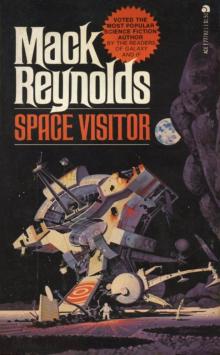 Space Visitor
Space Visitor A Kiss Before Loving
A Kiss Before Loving Episode on the Riviera
Episode on the Riviera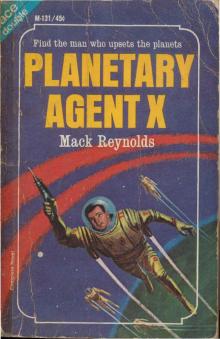 Planetary Agent X
Planetary Agent X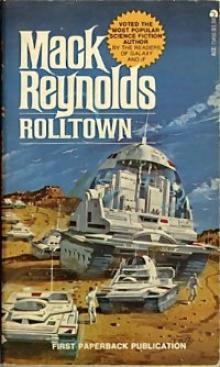 Rolltown bh-3
Rolltown bh-3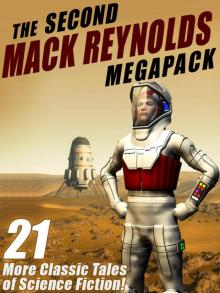 The Second Mack Reynolds Megapack
The Second Mack Reynolds Megapack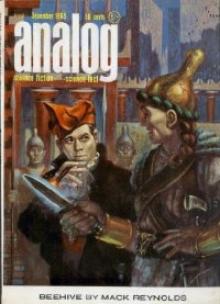 Dawnman Planet up-2
Dawnman Planet up-2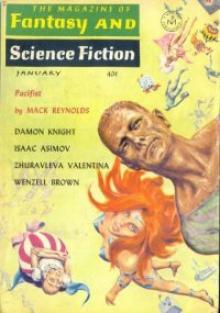 Pacifist
Pacifist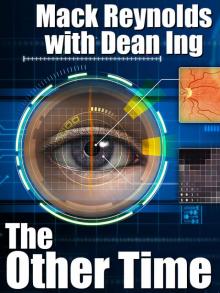 The Other Time
The Other Time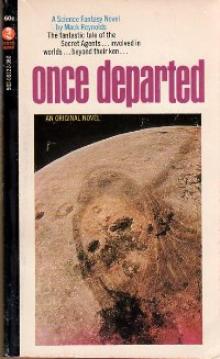 Once Departed
Once Departed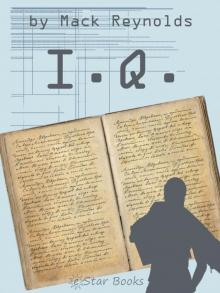 IQ
IQ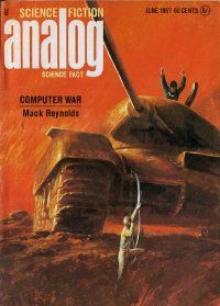 Computer War
Computer War Earth Unaware
Earth Unaware The Rival Rigelians up-3
The Rival Rigelians up-3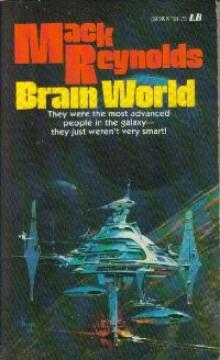 Brain World up-7
Brain World up-7 Star Trek - TOS - Mission to Horatius
Star Trek - TOS - Mission to Horatius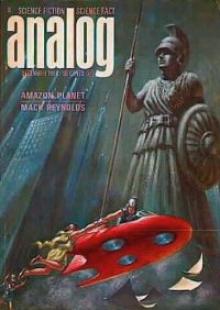 Amazon Planet up-5
Amazon Planet up-5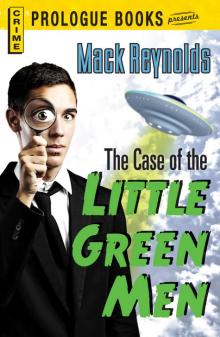 The Case of the Little Green Men
The Case of the Little Green Men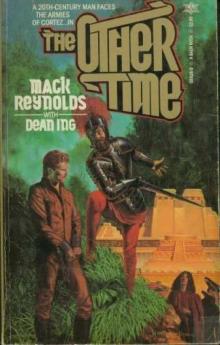 Other Time
Other Time The Mack Reynolds Megapack
The Mack Reynolds Megapack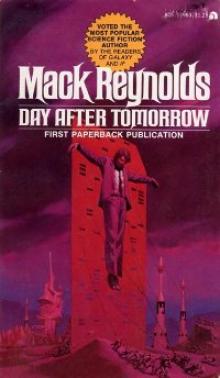 Day After Tomorrow
Day After Tomorrow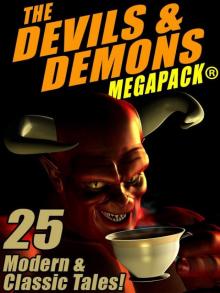 The Devils & Demons MEGAPACK ®: 25 Modern and Classic Tales
The Devils & Demons MEGAPACK ®: 25 Modern and Classic Tales Mission to Horatius
Mission to Horatius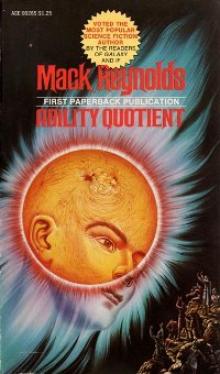 Ability Quotient
Ability Quotient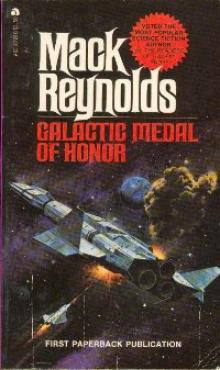 Galactic Medal of Honor
Galactic Medal of Honor Trojan Orbit
Trojan Orbit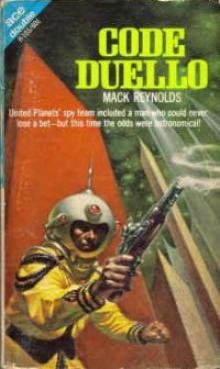 Code Duello up-4
Code Duello up-4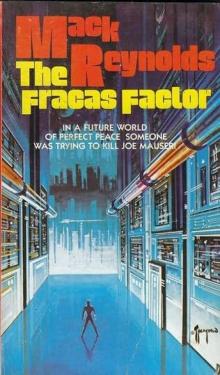 The Fracas Factor
The Fracas Factor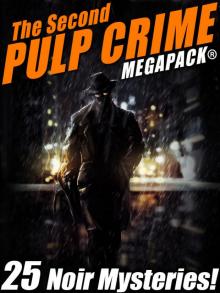 The Second Pulp Crime
The Second Pulp Crime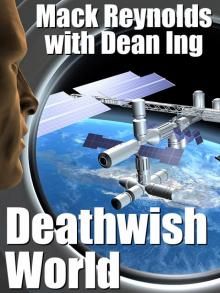 Deathwish World
Deathwish World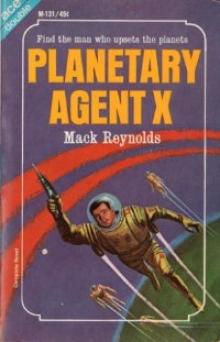 Planetary Agent X up-1
Planetary Agent X up-1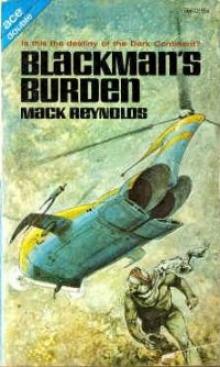 Blackman' Burden na-1
Blackman' Burden na-1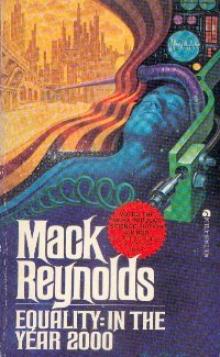 Equality: In the Year 2000 jw-2
Equality: In the Year 2000 jw-2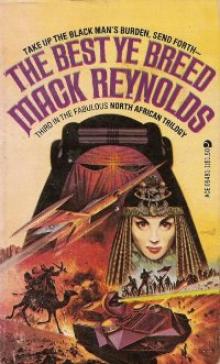 The Best Ye Breed na-3
The Best Ye Breed na-3 The Jet Set
The Jet Set The Rival Rigelians
The Rival Rigelians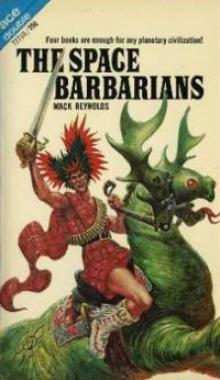 The Space Barbarians
The Space Barbarians